EVENTS 
|
|
Monday, November 21 - Tuesday, November 22
Michigan League
Friday, December 9
9:00 AM - 11:00 AM
BSRB Seminar Rooms
Friday, December 16
12:00 PM - 1:00 PM
BSRB Seminar Rooms
|
RESEARCH NEWS 
|
QUICKLINKS 
|
|
 |
|
 Funding Funding
|
 Training & Professional Development Training & Professional Development
|
 Announcements Announcements
|
|
Select Research Funding &
Award Opportunities
|
|
Award
|
Deadline
|
|
|
Friday, December 16
|
External Limited Submissions
|
Award
|
Deadline
|
|
|
Monday,
November 21
|
|
|
Thursday,
December 8
|
Bridging Support
Other Opportunities
|
Award
|
Deadline
|
|
|
Monday,
December 5
|
|
|
Monday,
December 5
|
|
|
Saturday,
February 4, 2017
|
Featured Foundation Grants
Visit the UMHS Corporate and Foundation Relations
website for more foundation funding opportunities.
|
Special Seminar on Aging and Metabolism & Translational
Research Town Hall
|
 |
|
Jay Chung led a large-scale collaborative effort involving seven institutions (including the University of Michigan) that has advanced understanding of molecular events that negatively impact weight gain and reduced physical fitness with aging. Conclusions were drawn from results in mice, monkeys, and rats. It was found that DNA-dependent protein kinase (DNA-PK) is a mediator of the aging-associated decline in metabolism and fitness. Aging increas
es DNA-PK activity, decreasing the ability of HSP90α to chaperone
clients such as AMP-activated protein kinase (AMPK). Inhibiting DNA-PK either genetically or with a small molecule inhibitor (NU7441) prevents the weight gain, decline of mitochondrial function, and physical fitness in middle age mice, and protects against type-2 diabetes in obese mice. It is concluded that DNA-PK acti
vates a metabolic brake which makes staying lean and physically fit more difficult at older age and increases susceptibility to metabolic diseases.
This event will be hosted by Steven Britton and Marschall Runge, and is sponsored by: U-M Department of Internal Medicine; U-M Department of Anesthesiology; U-M Molecular and Integrative Physiology; and the School of Kinesiology.
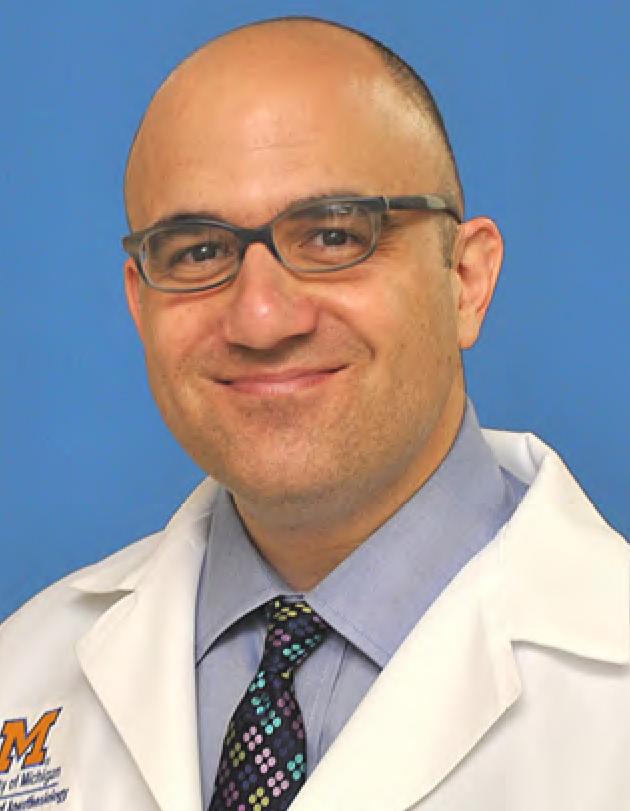
George Mashour, M.D., Ph.D., will lead the Town Hall on the topic of translational research at U-M and the many resources available to research teams across campus. A light breakfast will be served at 7:30 AM and the lecture/discussion will be from 8:00 AM - 9:00 AM in the Ford Auditorium at the University Hospital.
|
Friday, November 11
7:30 AM - 9:00 AM
Ford Auditorium
|
Join MICHR to discuss the state of translational research and learn about the many services and resources available to research teams across U-M.
Questions? Contact MICHR.
|
|
MIDAS Symposium Brings Top-Level Data Scientists to Campus
|
Attend the annual symposium on November 15 and November 16
|
The symposium will feature preeminent data scientists from around the world, and will highlight U-M researchers whose work is on the leading edge of innovation and discovery in data-intensive science. Keynote speakers are Robert Groves, provost of Georgetown University, and Sudip Bhattacharjee, chief of the U.S. Census Bureau's Center for Big Data Research and Applications.
|
November 15 - November 16
Michigan League and Rackham Graduate Building
|
The symposium will also feature speakers from around the country and world, taking part in panels on topics including:
- Big Data, An International Perspective
- Methodologies
- Health Research
- Social Sciences
- Transportation
- Learning Analytics
A poster session will also take place for faculty and students including opportunities for students to meet with potential employers interested in data scientists.
|
Attend the Importation Biological Materials Workshop
|
A FREE workshop on Wednesday, November 30
|
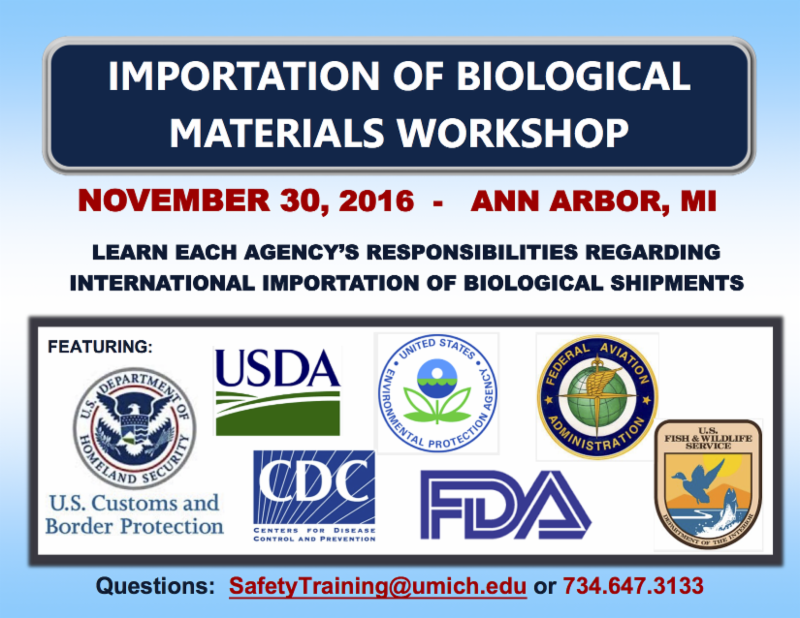
The workshop will include representatives from several federal government agencies including the Federal Aviation Administration (FAA), the Centers for Disease Control and Prevention (CDC), the U.S. Food and Drug Administration (FDA), U.S. Customs and Border Protection (CBP), the United States Department of Agriculture (USDA), the Environmental Protection Agency (EPA), and the U.S. Fish and Wildlife Service. These agencies will share their responsibilities, and discuss how to prepare materials for proper transport and how to apply for the necessary permits.
|
Wednesday, November 30
9:00 AM - 5:00 PM
NCRC Building 10, Research Auditorium
|
Members of the U-M research community are invited to join the Occupational Safety and Environmental Health Department (OSEH) for this unique opportunity of outreach and education.
Other colleagues or researchers at local universities who might benefit from this training are also welcome.
|
Attention! Administrators and Leadership Working with Research Faculty
|
Attend the Resources and Services for Research Success event on Friday, December 9
|

Designed for administrators and leadership who work with research faculty, this event will showcase research development services offered by our local informationists and librarians for helping investigators get ahead. Highlighted resources include tools for finding funding, developing data sharing and management plans, and keeping compliant with public access policies.
This free event will include a one-hour panel presentation from four experienced informationists and librarians from the U-M Library, moderated by Judy Smith:
- Finding funding - Presented by Darlene Nichols
- Federal mandates related to publication/data deposits, such as the NIH Public Access Policy - Presented by Merle Rosenzweig
- Deep Blue Data - Presented by Amy Neeser
- Data sharing plans - Presented by Leena Lalwani
The panel presentation will be followed by a Q&A session and networking for professionals interested in learning more about research development, including increasing extramural funding and enhancing career development for faculty.
|
R01 Grant Writing Workshop Now Open to All Faculty
|
|
Register for this all-day event, previously only accessible to R01 Boot Camp Mentees
|
This highly rated workshop is an annual event for R01 Boot Camp participants, and will be open this coming year to any faculty member interested in brushing up on NIH grant writing skills. The $180 fee (payable via shortcode) includes the workshop manual (GWSW's
Grant Application Writer's Workbook by Stephen Russell and David Morrison), session materials, breakfast, and lunch. Registration and breakfast will begin and 8:00 AM, and the workshop is from 8:30 AM - 5:00 PM.
|
Tuesday, February 7, 2017
8:00 AM - 5:00 PM
Palmer Commons Forum Hall
Registration Deadline: Tuesday, January 13
|
|
U-M Announces New Guidance for Animals Administered Human-Derived Substances
|
Your Laboratory May Need to Take Action by November 30
|
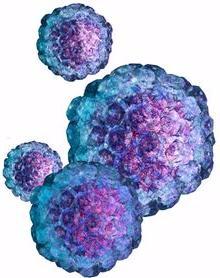
If your laboratory is currently working with human-derived substances, it is strongly recommended that you obtain testing documentation from your material provider and/or have the testing completed no later than November 30, 2016.
This will enable your laboratory to operate more efficiently and without any unnecessary expenses or delays; it will also enable ULAM to better estimate the number of animals that must now be housed under ABSL-2 conditions, and to prepare accordingly. Additional details on how to request this testing, as well as a list of external vendors offering discounted pricing exclusively to the U-M, is available
here
.
If you have any questions or concerns about this new guidance, or would like more information on how to obtain the appropriate panel testing, please contact the Animal Care & Use Office at
[email protected]
or (734) 763-8028.
|
U-M's probationary accreditation status has been extended for an additional six months
|
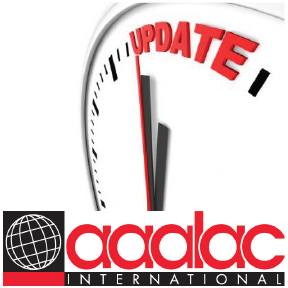
The Animal Care & Use Office is pleased to announce that the
AAALAC Council on Accreditation
has extended U-M's probationary accreditation status for an additional six months, effective October 14, 2016. The Council is very pleased with the advances the University has made thus far in implementing a wide array of long-term, campus-wide initiatives to strengthen U-M's Animal Care and Use Program.
By April 1, 2017, leadership will provide AAALAC with a revised Institutional Animal Care & Use Program Description. Upon receipt of the Program Description, AAALAC will conduct a mandatory site re-visit between May and July 2017.
Additional details about this site visit, including the specific dates that AAALAC will be on campus, will be provided as they become available.
Ensuring that all faculty and staff use best practices in their research and day-to-day operations continues to be of critical importance to our program's collective success, and in fostering a culture of sustained excellence in animal care and use at the University of Michigan.
It is important to note that, throughout these ongoing discussions with AAALAC, the U-M has remained a fully accredited institution. If you have any questions regarding AAALAC or our accreditation status, please contact the Animal Care & Use Office at
[email protected]
.
Ongoing news and information affecting the U-M animal care and use community can also be found in the monthly
Animal Care & Use Newsletter
.
|
Call for 2017 Nominations
|
Distinguished University Innovator Award
|

The U-M Office of Research is seeking nominations for the 2017 Distinguished University Innovator Award, the University's highest honor for faculty who have shown leadership in bringing new ideas to the marketplace.
Nominees can include a
current member of the tenure/tenure track or research faculty, or a team of up to three faculty.
Nominations are due January 11, 2017, and the selection will be announced in March 2017.
|
|
Open Michigan Initiative Launches New Partnership, Website
|
Open Michigan
is relaunching as the home for all things open at the University of Michigan - including expertise and services for
open educational resources (OER)
,
open data
, and
open publications
. It enables the University of Michigan community to make the products of its research, teaching, and creative work- such as freely accessible, openly licensed documents and media - available to the world beyond campus.
The new Open Michigan is a partnership of the University Library and Health Information Technology and Services (HITS). The Library and HITS have worked closely together in the past to host events, promote sharing, and create OER. By officially joining forces, Open Michigan can provide the University of Michigan community with a "one stop shop" for information and resources about open content of all kinds.
Researchers and learners from all over the world can find information about sharing research data, identifying reputable open access journals, and using openly licensed content in your work. This new site still has all of the previously available OER collections, and soon will begin to publish new materials, such as new solutions sets for Dr. Krishna Garikipati's popular YouTube lecture series, Finite Element Methods, and a training on improving hospital-based care for patients with Parkinson's disease.
|
"Since the initiative started in 2008, we have had much success in effectively maximizing the impact and reach of materials created by expert faculty, while providing support with copyright, licensing, content development, and publishing. It has been our pleasure serving the University and far beyond for these past eight years, and we look forward to many more,"
- Ted Hanss, UMHS associate CIO
|
|
|
Medical Discovery Space Expanding at NCRC
|
U-M Board of Regents has approved $78.5 million renovation project
|
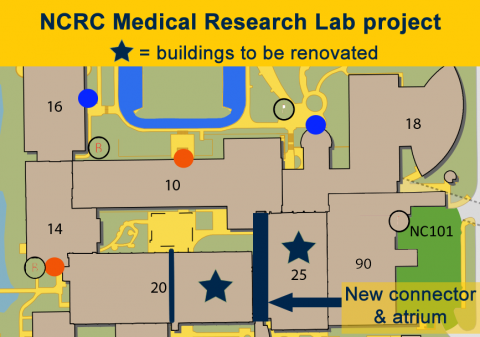 The last two empty buildings at
NCRC, 20 East and 25, will take on new life through a $78.5 million renovation project. This project was recently approved by the
U-M Board of Regents on October 20.
The
U-M Medical School will use the space to create more than 50 modern research laboratories for its faculty scientists and their teams, and spaces for them to connect with one another to fuel discoveries about many diseases.
The new labs will group researchers working on similar topics into "neighborhoods," with room for both labs and offices where teams can analyze the vast amounts of data that modern medical research generates.
The project will also give all researchers at NCRC a new gathering space, with a two-story atrium filled with natural light. A new two-story connector will make it easier for many at NCRC to navigate the interconnected buildings and connect with one another as they go.
|
"This is a major milestone in our progress toward redeveloping NCRC, and transforming it from an outpost of the university to a magnet. We're on track to achieve 100 percent utilization of the site's existing buildings by 2019."
|
|
|
Future Featured Foundation Grants
for Biomedical Research
|

In addition to the quickly-approaching deadlines listed above, UMHS Corporate and Foundation Relations would like to draw your attention to the following foundations who have future deadlines for biomedical research grants:
|
Award
|
Amount
|
Deadline
|
|
|
$500K
|
Tuesday,
January 3
|
|
|
$600K
|
Friday,
January 13
|
|
|
$100K
|
Friday,
February 3
|
|
|
$1M
|
Monday,
February 6
|
|
|
$1.2M - $2M
|
Saturday,
April 1
|
|
|
$1.2M - $2M
|
Saturday,
April 1
|
|
|
$1.2M - $2M
|
Saturday,
April 1
|
Questions about these award opportunities should be directed to Joe Piffaretti in UMHS Corporate and Foundation Relations via email at
[email protected]
or phone at (734) 763-1318.
If you are interested in receiving weekly funding announcements that include opportunities such as those listed above, please contact Joe Piffaretti to be added to the faculty/staff email circulation list.
|
|
Sharpening Your Focus:
Tips on Grant Proposal Preparation
|

By Jill Jividen, Ph.D., Senior Manager
for Research Development Support,
U-M Medical School Office of Research
(One in a
series
of tips published in UMMS Research News about writing proposals.)
A
new NIH policy will eliminate almost all appendix materials for proposals submitted to NIH, AHRQ, and NIOSH on or after January 25, 2017.
Appendices have not been prohibited in the past, but investigators were instructed not to use appendix materials to circumvent proposal page limits, i.e., append details that should have been included in the Research Plan. This new policy aims to enhance fairness in peer review and limit the burden on reviewers; eliminating most appendix materials is "intended to rectify inequities...that can arise from submission of inappropriate or excessive appendix materials."
Beginning January 25, 2017,
only the below appendix materials will be allowed.
For applications involving clinical trials:
- Clinical trial protocols
- Investigators' brochure from Investigational New Drug (IND), as appropriate
For all applications:
- Blank informed consent forms
- Blank surveys, questionnaires, data collection instruments
- FOA-specified items
Per NIH guidelines, always defer to individual FOA instructions, the details of which override general notices. In other words, if appendix materials are required per FOA instructions, applications that are missing those documents will be considered incomplete and will not be reviewed.
NOT-OD-16-129
|
|
|